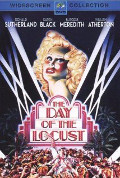
Directed by
John Schlesinger
144 minutes
Rated M
Reviewed by
Bernard Hemingway


The Day Of The Locust
John Schlesinger’s acerbic portrait of studio-era Hollywood as a peddler of dreams for the great unwashed is a cleverly crafted film although its climactic apocalyptic vision of a world gone mad is perhaps a little out of kilter with the essentially small story of broken dreams that constitutes the bulk of the film.
Based on a novella of the same title by Nathanael West (real name Nathan Weinstein), who died relatively young in a car accident in Hollywood in 1940, and adapted for the screen by Waldo Salt, this is F.Scott Fitzgerald without the white tie, cocktails or laughter. William Atherton, an actor who never caught on as a leading man, plays the West alter ego, Tod Hackett, an aspiring film designer who despite a measure of success is fascinated by the Tinseltown flotsam and jetsam he encountered in his early days, in particular Faye Greener, a would-be starlet. In this role Karen Black gives a wonderful performance, arguably the best of her career, as a character who exerts her charm on weak men but is too common to go beyond those limited conquests.
Reminiscent of other films from the same era such as They Shoot Horses, Don’t They? (Sydney Pollack, 1969) both technically and in its relentlessly pessimistic view of free market society, a view indicated by the suggestive but unexplained (Biblical?) title, it will not please everyone but if you're disposed to a melancholy view of the world this is well-worth adding to your list of kindred spirits.
Donald Sutherland plays Homer Simpson (why Springfield's famous yellow paterfamilias should share the same name is not apparent) a character reminiscent of Steinbeck’s Lenny or even Shelley’s Frankenstein, whilst Burgess Meredith's broken-down vaudevillian and Billy Barty’s midget add to the Goya-like sense of the grotesque.
Want something different?





